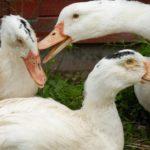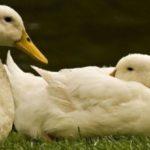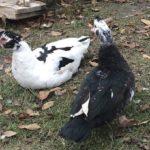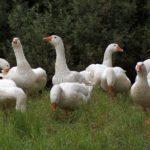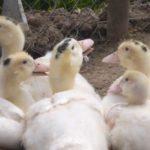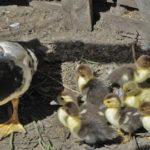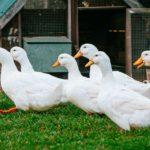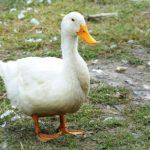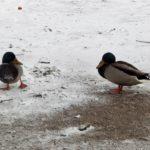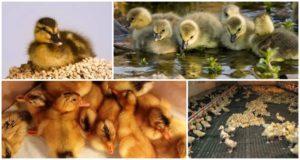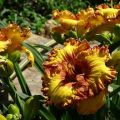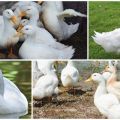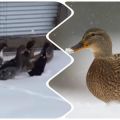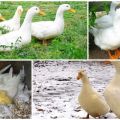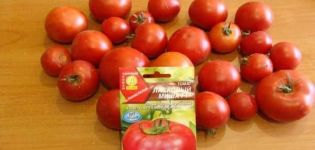Why do ducks bite each other and pinch each other and what to do with cannibalism
When breeding ducks, it is important to take into account all the features of keeping these birds. Sometimes farmers face different violations. Experienced poultry farmers often notice that adults and young ducklings tend to pinch each other's feathers. This provokes serious damage. To cope with the violation, you need to understand why ducks pinch each other.
Why do ducks peck each other
Feather plucking is common in domestic birds. This is done not only by ducks, but also by chickens or turkeys. However, it is especially common for ducklings to pluck feathers. This is due to the free range of the grown ducklings. They are released into the pasture at 2 months. Adults are not too happy with babies. This is due to the competition of birds. Therefore, ducks often pinch or even eat ducklings.
Inadvertent cubs take an example from adult birds and also begin to pinch feathers. This becomes the cause of fights or aggression. The following factors lead to unusual behavior and the appearance of cannibalism in ducks:
- eating disorders or lack of water;
- excess food;
- small corral;
- changes in nutritional requirements for ducks;
- shortage of feeders or water tanks;
- the presence of aggressive birds in the flock.
Duck Conflict Solutions
There are many options for resolving conflicts between birds. First of all, it is worth changing their diet.
Changing the diet
That mulards peck at each other due to improper nutrition. This also applies to other breeds. To deal with a violation, it is recommended that you follow these rules:
- Add useful additives to the feed. These include arginine, cystine, methionine. Ducks also need sulfur or calcium. With a sufficient amount of such substances, ducks will not pluck feathers. In addition, useful elements help feathers grow on the affected areas of the body. Sulfur also normalizes metabolic processes and accelerates weight gain. She should be in the diet starting at 2 weeks.
- Introduce feed containing iron and copper sulfates. Ducks also need sodium selenite, Biovetin, citric acid. In addition, they need to be given cobalt chloride.
- Give the birds meal. Ducks are in need of flax, sunflower and soybean cake.
- Give the ducks fresh fish. For feeding birds, it is permissible to use capelin or sprat. It is also allowed to use meat and bone meal or minced meat for feeding. To get rid of the problems, it is recommended to give 1 individual at least 50 grams of fat per week.
- Introduce milk into the diet. It is also permissible to give the birds milk waste.
- If there is a reservoir nearby, be sure to take the ducks to swim. When a problem arises, small shells or duckweed will be an excellent food option.
- It is useful to give the birds fresh herbs and grass flour. Also, ducks feel the need for chopped pine or spruce needles.
- Ducks need crushed chalk. If birds are pinching each other's feathers, it is recommended to increase the daily amount of table salt.
- In order to reduce the cost of the content of approximately 40% of cereal feeds, it is worth replacing with a simple mixture consisting of greens, boiled potatoes, and bread. From greens, it is useful to give ducks beet tops, nettles, cabbage, dandelion foliage.
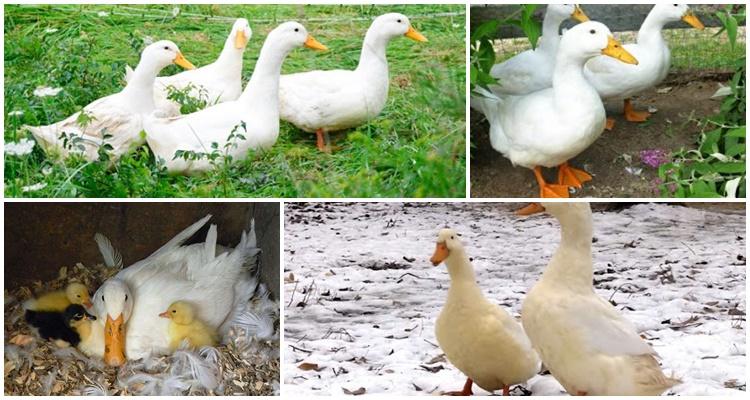
We calculate and remove the aggressor
If it turned out to find an individual that pinches other ducks until it bleeds, it is recommended to catch it and place it separately. After isolating an aggressive bird, it is recommended to feed it correctly and control its behavior. Usually a balanced diet will help completely solve the problem. Only after eliminating the signs of aggression is it permissible to return the duck to its place.
We make good access to drinkers and feeders
If biting of birds is observed, it is worth examining the courtyard. Sometimes the problem is caused by incorrect calculation of the number of feeders and drinkers. This provokes fights between birds. If such problems are identified, it is worth increasing the number of access points to food and water and try to make them as comfortable as possible.
Changing the lighting in the house
In winter, birds often peck at each other due to improper daylight hours. There are many factors to consider when creating house lighting.
The brightness of the lighting is of great importance. It should normally be 15 lux. For this, it is enough to use several 40-60 Watt bulbs. They should be evenly distributed around the perimeter of the house.
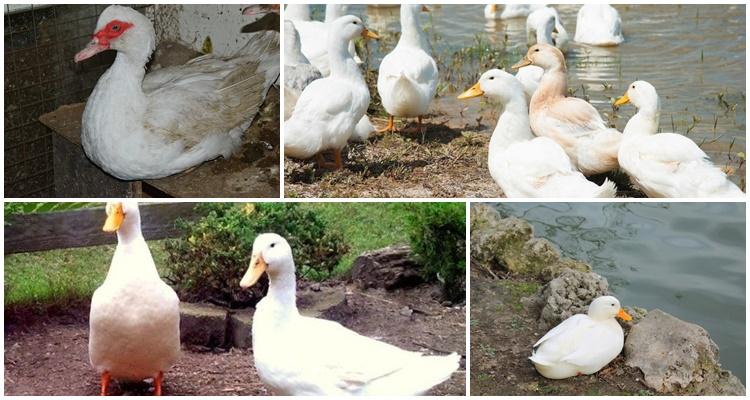
We observe the level of humidity in the room
When breeding ducks, it should be borne in mind that they are water birds that are sensitive to any changes in moisture parameters. At the same time, the birds can hardly tolerate changes in humidity. This provokes the appearance of condensation on their feathers.
To maintain the required humidity parameters at home, it is worth placing a hygrometer in the house. Different methods can be used depending on its parameters. So, it is permissible to locate a gas boiler or a stove-stove in the room, which will remove excess moisture. In case of insufficient performance, on the contrary, it is recommended to use a humidifier. In winter, humidity parameters should always be 50-60%, and the air temperature cannot drop below + 5-7 degrees.
Possible complications
If musk or other species of ducks pull each other's feathers, it has negative consequences. When the wings or body are pecked, dangerous wounds appear, which provokes the emergence of cannibalism in the herd.
As blood flows out, the ducks peck at the wounds more and more. This provokes severe blood loss or infection. As a result, the threat of death of the bird is high.
How to prevent a problem from arising
To prevent such problems, it is recommended to adhere to the standards of keeping and feeding birds. If the number of nests is not enough, it is worth making additional ones. This will help avoid conflict situations. The most aggressive birds should be separated. It is not recommended to change the conditions of keeping or the areas of bird walking.This must be done gradually, taking into account the desires of the birds.
If ducks bite themselves constantly, it is important to keep the room clean. This will help prevent dirt and infection from entering the damaged area. At the same time, it is recommended to do a general cleaning of the premises weekly, wash the floor every day, and clean the feeders and drinkers. If dirt gets into the water, it must be replaced. Food and water should be at room temperature. From time to time it is worth showing the birds to the veterinarian. Prophylactic examinations are recommended to be performed at intervals of 6-12 months.
Ducks pinch each other for a variety of reasons. The provoking factors of problems include malnutrition and violation of conditions of detention. To cope with the violation, it is worth adjusting the bird care rules.
